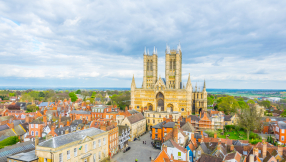
The Welsh Revival of 1904 was anything but quiet, leading to the worldwide Pentecostal and charismatic movements. This is the story …
Welsh Revivals
Wales was a land of revivals. There had been many revivals across Wales at separate times of history, going back to St David. However, it is the Welsh Revival of 1904 which had the biggest impact on the worldwide Church. The Welsh Revival began at Moriah Chapel, in the small town of Loughor, at the mainland end of the Gower peninsular, near Swansea, in south Wales. The revival started at a prayer meeting held in the Moriah schoolroom on 31 October 1904.
The meeting had 17 people present and was led by Evan Roberts, then 26 years old, who became a household name. Those people present all made a renewed commitment to God. The chapel was named after Moriah, which references the land of Moriah where Abraham went to sacrifice his son Isaac (Genesis 22:2), and to Mount Moriah where the temple was later built (2 Chronicles 3:1). These are probably separate places but linked in the popular imagination.
The church was part of the Welsh Calvinist Methodist movement (which since 1928 has also been known as the Presbyterian Church of Wales). The Welsh Calvinist Methodist church itself arose from a previous revival in the 18th century. The revival spread as Evan Roberts was invited to speak at other places. It was reported that within nine months some 100,000 people were converted.
Welsh Revival 1904
The Welsh Revival, under the leadership of Evan Roberts, was a transformative movement in Wales. It was characterised by fervent prayer, spontaneous worship, confessions, and a strong emphasis on the direct experience of the Holy Spirit.
The Holy Spirit cut across denominational and theological boundaries. The revival broke down the traditional theological and linguistic boundaries which had ruled Welsh church traditions. The Holy Spirit came upon men and women, young and old, ordained and unordained, Welsh speakers and English speakers. Great preachers and evangelists, both men and women, arose to continue the work.The revival energised the chapels and denominations in Wales, starting with the Calvinistic Methodists, and spreading to the Baptists, the Congregationalists (Independents), and the Wesleyan Methodists.
Services were marked by unstructured worship, emotional reactions, simultaneous prayer, visions, healings, and prophecies. The revival swept through Welsh society, resulting in mass conversions measured in the tens and scores of thousands. Reports at the time state that it produced visible changes in social behaviour, such as decreased crime rates, lower levels of swearing, drunkenness, and violence.
British Pentecostalism
The early leaders of the British Pentecostal movement came out of the Welsh Revival and whole new denominations arose. The Elim Pentecostal Church, started in 1915 in Monaghan, Ireland, was founded by the Welsh evangelist George Jeffreys, who had been greatly influenced by the 1904 Welsh Revival. The name "Elim" comes from an oasis and place of refreshing where the Israelites went after leaving captivity in Egypt (Exodus 15:27). Elim churches are now found across Britain and Ireland, and beyond.
In 1916, the Apostolic Church of Wales grew out of a revival in Pen-y-groes, Carmarthenshire. The movement sent missionaries around the world. In the UK it is still strongest in South Wales where it began, but internationally it is now strongest in Nigeria.
Across the World
News of the Welsh Revival sparked intense prayer and subsequent revival outbreaks around the world. The revival rapidly spread throughout Wales to the rest of Britain, to Scandinavia and parts of mainland Europe, resulting in large numbers of conversions and new waves of evangelical fervour.
Revivals happened across the world in parts of China, Korea, Madagascar, and India, especially in places where Welsh missionaries were working. A notable revival happened in the Khasi Hills in northeast India in 1905, between what is now Bangladesh and Myanmar (Burma). Today some of these areas particularly northeast India and south Korea are today noted for their huge populations of evangelical Christians.
North America
News of the Welsh Revival rapidly spread internationally, inspiring Welsh and other Christians in the United States, to pray for and expect similar outpourings. Some Americans came from the US to south Wales and returned deeply influenced, and some corresponded with Evan Roberts. The Welsh Revival directly inspired the Azusa Street Revival in Los Angeles in 1906, which is widely recognised as the birthplace of the modern American Pentecostal movement. In 1914, in Arkansas, the Assemblies of God (AoG) arose as a new Pentecostal denomination, which is now worldwide.
Impact on Female Ministry
The Welsh Revival led to many women, as well as men, becoming singers, evangelists, teachers and preachers. The story can be read in "Carriers of the Fire – The Women of the Welsh Revival 1904/05" by Karen Lowe. At the original Pentecost, Joel's prophecy “And it shall come to pass… that I will pour out my Spirit on all flesh; your sons and your daughters shall prophesy... Even on the male and female servants in those days I will pour out my Spirit” (Joel 2:28-29), was quoted by St Peter (Acts 2:16-18), which makes it clear that the Holy Spirit did not distinguish between men and women.
As a result, most Pentecostal denominations have equality in ministry for men and women. The most famous is Aimee Elizabeth Semple McPherson, who in 1919 was ordained as an evangelist by the Assemblies of God. Her church in Los Angeles, was the first megachurch in the USA.
Legacy on the worldwide Church
Pentecostalism is characterised by its emphasis on the work of the Holy Spirit, personal faith, equality between men and women in leadership, and freedom of worship. The revival’s emphasis on direct spiritual experience, charismatic gifts (1 Corinthians 12), and Spirit-filled worship has also influenced the traditional historic denominations, such as the Catholic Church and the Anglican Church, where it is often known as the Charismatic Renewal. The legacy of the Welsh Revival has been a general renewed emphasis or re-discovery of the Holy Spirit in Christian faith and practice, with an impact on whole new traditions of worship.













